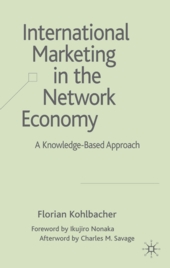
Details
2007, £55.00, Palgrave Macmillan, Basingstoke, 280 P. [Order]Authors
Reviews
Book Review: International Marketing in the Network Economy: A Knowledge-based Approach International Marketing Review. 26(2)
pp. 244-246
International Marketing in the Network Economy: A Knowledge-based Approach

Scholars and practitioners around the globe have identified the capability of MNCs to create and efficiently transfer and combine knowledge from different locations worldwide as an increasingly important determinant of competitive advantage, corporate success and survival. Traditional marketing approaches have overly focused on explicit knowledge and neglected the important role of tacit knowledge, specifically in international, cross-cultural settings. This book draws on real-life examples of knowledge-based firms – Hewlett-Packard Consulting & Integration, Schindler, Siemens, Toyota, Mazda, and Maekawa – to reveal that knowledge-based marketing is key to obtaining a sustainable competitive advantage.
Contents
- Foreword; Ikujiro Nonaka
- Preface
- Introduction
- Aims of the Book and Research Questions
- Theoretical Framework: The Knowledge-Based View of the Firm
- Knowledge-Based Management and Organizational Learning in Marketing
- The Case Studies
- Knowledge-Based Marketing: Results and Conclusion
- Afterword; Charles M. Savage
- Appendix: Research Methodology and Empirical Research
Reviews
‘This book is a consequent and smart application of the knowledge creation theory to the field of marketing. The proposed shift in marketing towards the knowledge-based paradigm has vast theoretical and practical implications. Kohlbacher convincingly illustrates how companies create and leverage marketing knowledge to successfully compete in the network economy of today.’ – Hirotaka Takeuchi, Professor and Dean, Graduate School of International Corporate Strategy, Hitotsubashi University, Tokyo
‘Knowledge management approaches and techniques have mostly found their application in functions such as R&D, manufacturing, logistics, and service. This book explores the value of knowledge in marketing and how the creation of so called “marketing knowledge” can be more effectively enabled. The book is a must-read for anyone interested in the creation and transfer of marketing knowledge. The many case studies in the book provide great insights for managers who strive to improve marketing in their firms.’ – Georg von Krogh, Professor and Chair of Strategic Management and Innovation, ETH Zurich
‘Dr Kohlbacher synthesizes a vast amount of research to create a convincing argument that the canny marketing manager has an impressive array of knowledge-based capabilities available for development and leveraging – especially the tacit knowledge that is so critical to lasting advantage. The book is a welcome, significant addition to the growing body of academic research on managing knowledge assets.’ – Dorothy Leonard, William J. Abernathy Professor of Business, Emerita, Harvard Business School; author of Wellsprings of Knowledge: Building and Sustaining the Sources of Innovation
‘Kohlbacher shows a formidable ability to integrate state-of-the-art theory with data from world-leading companies. His treatment of knowledge as the basis for marketing success is truly international. He assumes the dual roles of reflective scholar and reflective practitioner, not least by respecting the need for both systematic marketing research and experiencial and tacit knowing. It is not only a seminal contribution to research but a platform for the rejuvenation of executive training.’ – Evert Gummesson, Professor, Stockholm University School of Business, Sweden
‘The marriage of marketing and knowledge management – and specifically knowledge-creation theory – is long overdue. Kohlbacher’s timely book challenges the academic marketing community to rethink its assumptions about the nature of marketing knowledge as a competitive resource especially in international and cross-cultural contexts.’ – Nigel J Holden, Professor and Director, Institute of International Business, Department of Strategy and Innovation, Lancashire Business School, University of Central Lancashire